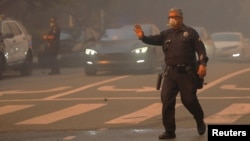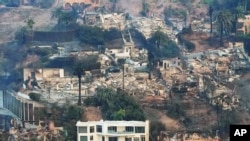The World Meteorlogical Organization says that preventive action cannot avert natural disasters such as the wildfires raging across Los Angeles, but that it can help save lives and mitigate loss of property.
“Land management and prevention, regular clearing of underbrush play a key role in fire management, and evacuation plans are important in saving lives,” the WMO said Friday. “These are all part of effective early warning systems.”
In a briefing to journalists in Geneva, Claire Nullis, a WMO spokesperson, stressed the importance of preparing adequate evacuation plans and early warning systems to prevent some of the worst impacts from a natural disaster.
While acknowledging the staggering losses from the devastating wildfires sweeping across parts of Los Angeles in the United States this week, she said “The early warnings have, in this instance, been very, very good.
“You know, people have been evacuated. It has been impossible to save houses, and the loss of life is still too high, but it has been kept to a relative minimum,” she said.
Media reports say at least 10 people have been killed in this week's Southern California wildfires, although more bodies are expected to be found once the fires have been contained and searchers can go through the debris.
More than 10,000 structures reportedly have burned, and 180,000 people are under evacuation orders.
While California is no stranger to wildfires, the WMO calls this catastrophic event “extraordinary” in that it is affecting one of the largest cities in the United States.
The WMO said that last year’s rainy season for the Los Angeles area as a whole was slightly above normal, but so far, this year it has been dry.
“The big compounding factor in this context is the winds. … They cause temperatures to rise, and they cause very low humidity, drying out the ground and vegetation,” Nullis said.
The WMO said destructive wildfires have been made worse by climate change.
“Climate change, including increased heat, extended drought and a thirsty atmosphere, has been a key driver in increasing the risk and extent of wildfires in the western United States during the last decades,” it said, citing data from the U.S. National Oceanic and Atmospheric Administration.
The WMO said wildfires require the alignment of a number of factors, including temperature, humidity and the lack of moisture in fuels such as trees, shrubs, grasses and forest debris.
“All these factors have strong direct or indirect ties to climate variability and climate change,” it said.
“Obviously, not every single weather-related disaster is due to climate change,” WMO spokesperson Nullis said. “Nobody would say that. But we get quite clear signals that climate change is exacerbating some of these disasters.”
In addition to the loss of life and destruction of homes and other infrastructure that could total billions of dollars in insured losses, the World Health Organization warns that wildfires can have a significant impact on human morbidity and mortality.
“Wildfire smoke, which is a mixture of air pollutants, of which particulate matter is of major concern as it can be full of PM 2.5. This is a very small particulate matter that gets right down into the lungs, and there certainly is a lot of it.” said Dr. Margaret Harris, a WHO spokesperson.
“A lot of it is associated with premature death in the general population,” she said. “It can cause and exacerbate diseases of lung, heart, brain, the nervous system” and other illnesses.
“It has been shown to lead to cognitive impairment and actually damage your intellectual capacity and lead to memory loss,” she said, adding that firefighters and emergency response workers “are most at risk from exposure to smoke.”
The WHO estimates 4.2 million deaths globally are linked to ambient or outdoor air pollution, with 99% of the global population exposed to air pollution levels that exceed the WHO guideline level for fine particulate matter (PM 2.5).
Harris said more research is needed to understand the long-term health effects of wildfire exposure on vulnerable populations, particularly children, older people, pregnant women and the chronically ill.
“We expect that we will see this over and over again if we do not get what we are doing to the planet under control,” she said.
Meanwhile, the World Meteorological Organization has officially confirmed that 2024 was the hottest year on record, “with a global mean temperature of more than 1.5 degrees above the 1850-1900 average.”
“We have just endured the hottest decade on record, with 2024 topping the list,” U.N. Secretary-General Antonio Guterres said, noting that “blazing temperatures in 2024 require trailblazing climate action in 2025.”
“There is still time to avoid the worst of climate catastrophe. But leaders must act now,” he said.








